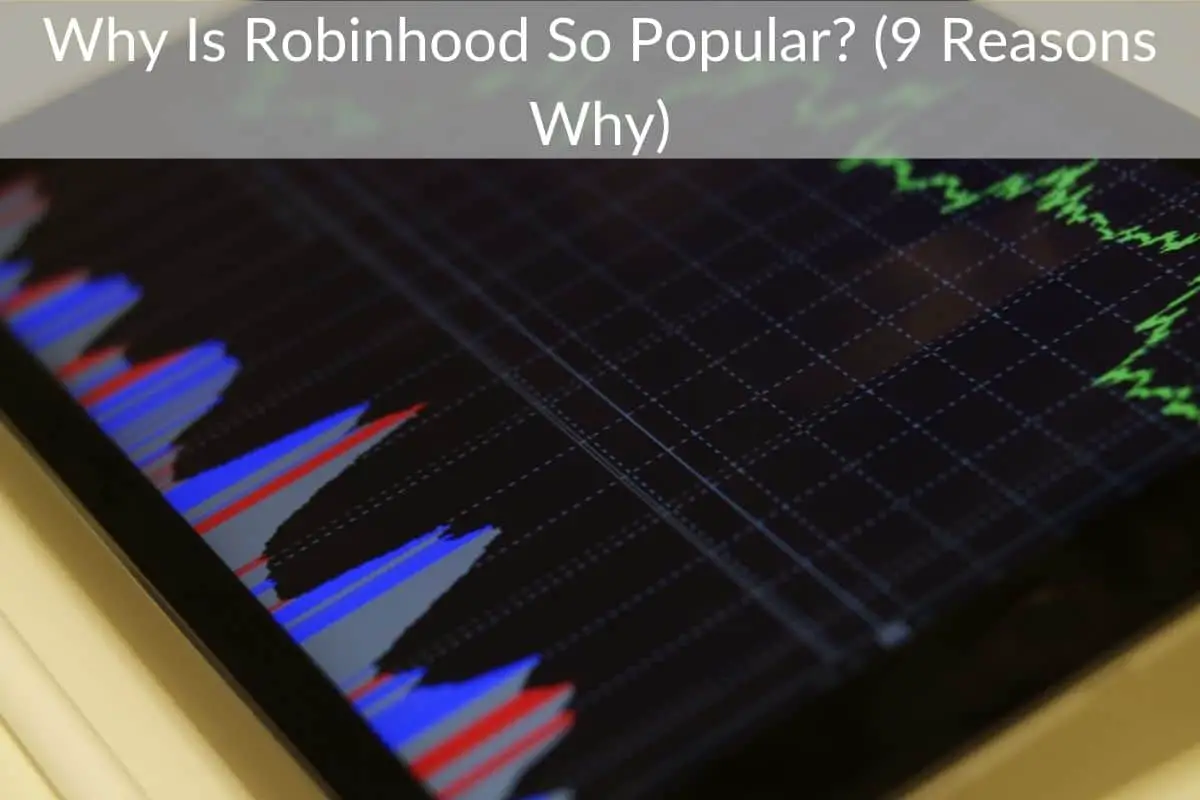Table of Contents
*This post may contain affiliate links. As an Amazon Associate we earn from qualifying purchases.
Robinhood is one of the fastest growing online brokerages. But, why is Robinhood so popular?
The popularity of Robinhood can be attributed to the fact that they give inexperienced investors the opportunity to start buying and selling stocks easily. Some of user’s favorite Robinhood features include commission-free stock, ETF and options trades, a streamlined trading platform and free cryptocurrency trading.
If you’re thinking of joining Robinhood, I’m going to help you make an informed decision by telling you everything you need to know about this popular online trading platform.
Why is Robinhood so Popular?
Here are a few reasons why Robinhood has grown so rapidly in the past couple of years:
1. Zero Commissions & Fees
What’s better than free? Robinhood’s commitment to providing 100% commission-free stock, options, ETF and cryptocurrency trades is admirable.
And the savings for investors who trade frequently is significant.
This is especially true for options traders — Robinhood is among the handful of brokers that don’t charge a per-contract fee.
Still, these days many big-name brokers also offer free trades, so it makes sense to compare other features when picking a broker.
Robinhood also seems committed to keeping other investor costs low.
The Clearing by Robinhood service allows the company to operate on its own clearing system, which reduces some of the service’s account fees.
One of the biggest fees Robinhood charges is the $75 outgoing account transfer fee, but that’s not an unusual fee among brokers and most people won’t need to move stocks from one account to another anyway.
2. No Account Minimum
Robinhood doesn’t have an account minimum, which means investors can get started right away. Of course, in order to invest, you’ll need enough to purchase the investment you have your eye on.
Like other brokers, Robinhood does require a $2,000 minimum portfolio balance to open a margin account. This is a Financial Industry Regulatory Authority regulation.
3. Fractional Shares And Recurring Investments
Like some other brokers, including Interactive Brokers and Charles Schwab, Robinhood has introduced fractional shares.
That means you can pay as little as $1 for a portion of a share, even if that share’s full price is in the hundreds of dollars.
This feature makes it much easier to build a diversified portfolio — you’re able to buy many more companies, even if you don’t have a lot of money to invest.
Fractional trading pairs perfectly with Robinhood’s newest feature: recurring investments. All you have to do is set a schedule (weekly, biweekly, monthly, etc.) and a dollar amount, and Robinhood will automatically invest the amount you want, when you want.
While this isn’t an uncommon feature among brokers, using it alongside fractional shares is a standout benefit.
When recurring investments are based on buying by-the-share (versus a dollar amount), you’ll inevitably end up with uninvested cash, but Robinhood has solved this problem.
Fractional shares have also given the company the opportunity to offer a dividend reinvestment program (known as a DRIP), which it didn’t previously.
This is a very valuable strategy for building wealth over time, much like recurring investments.
By offering the fractional shares/recurring investments/DRIP package, it seems Robinhood is working to stay competitive with the major brokers now that free trades are commonplace.
4. High-Yield Savings
Robinhood also offers a cash management account that currently pays 0.30%.
The account comes with a debit card and free ATM withdrawals from more than 75,000 ATMs, and offers up to $1.25 million of FDIC insurance thanks to Robinhood’s agreements with several banks.
5. Access to Cryptocurrencies
Unlike many traditional brokerages, Robinhood users can buy certain cryptocurrencies right in their stock trading account.
What’s more, it’s completely free. Pure-play crypto brokerages generally charge relatively high fees for a similar service. There is, however, a catch (see below).
6. Ease of Use
If you’re accustomed to using a smartphone — and Robinhood’s target user base obviously is — you’ll find the sign-up and account funding process quick and painless.
It all happens within the app in a matter of minutes, with just a few quick questions that gather your…
- Personal information
- Contact details
- Social Security number
- And means of funding your account
The company says approved customers are notified in less than an hour, at which point they can initiate bank transfers.
Robinhood uses instant verification with many major banks, sparing users the hassle of reporting micro-deposits to an account to verify information.
Bank transfers of up to $1,000 are available instantly for investing, as are proceeds of up to $1,000 from selling stocks.
Deposits larger than $1,000 will take four to five business days to process.
We should note, however, that Robinhood has been the subject of complaints suggesting that signing up may be too easy.
So while it’s true you can start investing with Robinhood in no time, users should be certain they understand the risks of investing before diving in.
7. Streamlined Interface
This could be a negative, as the service doesn’t offer all the bells and whistles of a typical online stock broker.
But for investors who know what they want, the Robinhood platform is more than enough to quickly place trades.
It supports:
- Market orders
- Limit orders
- Stop limit orders
- And stop orders.
Both the mobile and web platforms also include a feature called collections, which are stocks organized by sector or category.
Examples include companies with female CEOs of companies in the entertainment industry. On the web, collections are sortable and allow investors to compare stocks side by side.
Robinhood also offers a tab bar at the bottom of the app, which offers quick access to portfolio values, watch lists, transaction history and account statements.
8. Robinhood Gold
Robinhood Gold offers investors the ability to trade on margin, also known as borrowed money. The opt-in service carries a flat monthly fee of $5.
New investors should be aware that margin trading is risky.
You’re trading on money borrowed from the broker, which means you can lose more than you invest.
9. Improved Research Offerings
Though Robinhood’s offerings still pale in comparison to other brokers, the company has made strides to increase the tools and research available for customers, offering:
- Analyst ratings
- Lists of top movers
- Earnings calendars
- And links to earnings calls
Candlestick charts are available on mobile, and the service resurfaces information from other Robinhood customers to create its own universe of data.
For example, investors can view the 100 most popular stocks on the platform and sort them by various criteria, including analyst ratings, what’s rising over a given period (or what’s falling), market cap and price.
They’ll also have access to a few great data sources, including Wall Street Journal Markets, Reuters, Barron’s and CNBC Business.
Final Thoughts
Why is Robinhood so popular? For many reasons. The important question is “is Robinhood right for you?”
If a streamlined trading platform or the ability to trade cryptocurrency are important to you, Robinhood is a solid choice.
But now that plenty of online brokers have joined Robinhood in offering commission-free trades, casual investors can afford to shop for the broker that suits them best.

